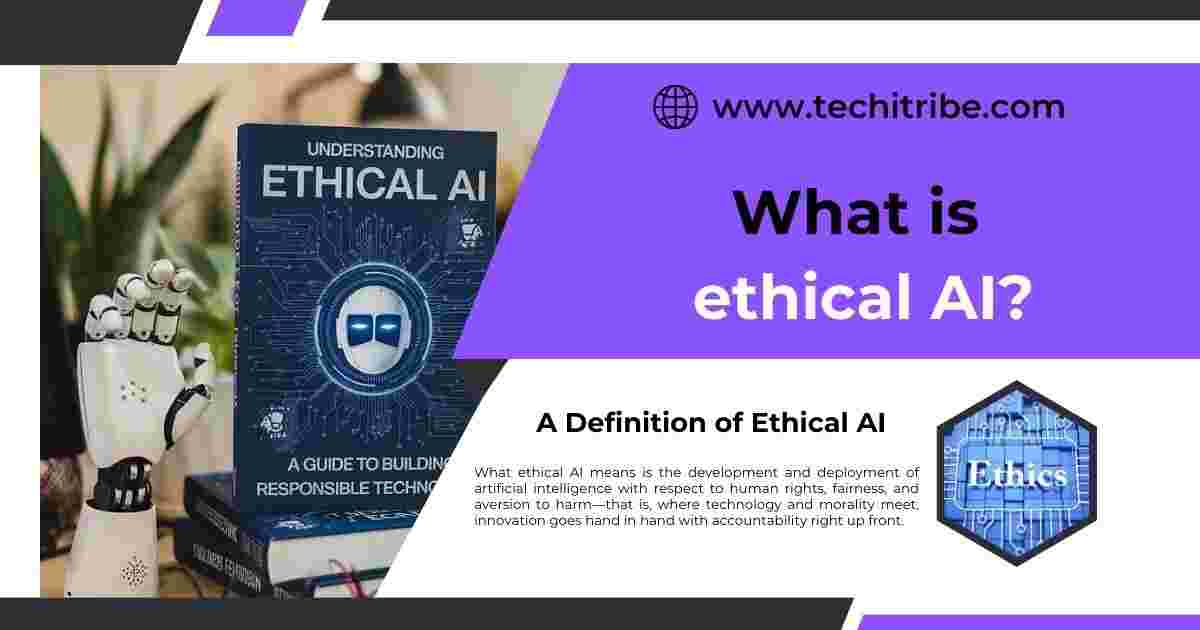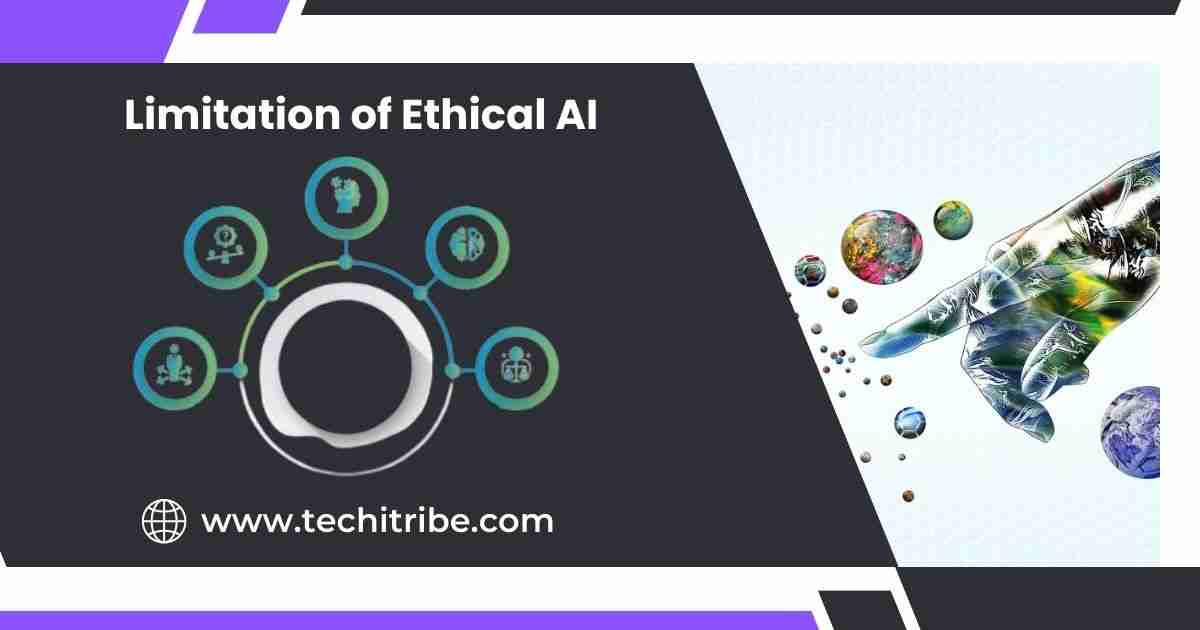Ethical AI, The Fourth Industrial Revolution, namely, artificial intelligence, is something that once lived in science fiction for ages and has now become a reality. It is revolutionizing the face of the whole industry, redesigning business, and impacting day-to-day life. However, again, power comes with responsibility; because AI develops at a very phenomenal speed, ethical considerations can become sharper-edged. Building responsible technology is inescapable. Not only does it need to be smart, but it must also be fair, transparent, and aligned to human values.
It reflected all the pillars of ethical AI, issues of its implementations, and how it can practically move toward having technology for good.
Also Visit On This Link: Stop trying to reinvent the wheel, IT Departments.

What is ethical AI?
A Definition of Ethical AI
What ethical AI means is the development and deployment of artificial intelligence with respect to human rights, fairness, and aversion to harm—that is, where technology and morality meet, innovation goes hand in hand with accountability right up front.
For instance, the AI recruitment system should not be biased with demographical characteristics. It should design the face recognition algorithm that is not biased in racial and gender constructs. That can be through the ethics of AI. It ensures that the systems are going to pay their respects to social values rather than pointing out inequalities.
Implications of Ethical AI
This is because AI is going to have very significant impacts in almost every sphere of life, whether it is health-care decisions or deciding the stream in education. Ethical AI would control AI such that letting AI run wild would lead to disastrous consequences, including discrimination, loss of privacy, and sometimes civil disturbance.
For example, biased algorithms in the judiciary system can behave discriminatorily towards certain sections or individuals. Misdealing with sensitive information is an act of violating privacy. Ethical AI will ensure all such risk factors are eliminated from occurring and bring the technology to good usage rather than using it for vices.
Principles of Ethical AI
1. Decision-making process
Explain the process of decision-making.
All those aspects of the process are crystal-clear when it comes to the ethics of AI. “We find that transparency in AI decision making is critical – without it, trust erodes and misuse is a risk.”
For example, credit scoring must be able to tell why the loan application was approved or declined. Clarity breeds trust, but with this platform will also be the chance to question or even contest the AI-based outcomes.
2. Fairness: Debiasing of AI Systems
The concept of fairness would be that the operating AI system should not be discriminatory toward any individual or a group of people. It is highly sensitive, and if the discussion were happening regarding the domains of recruitment or hiring, lending, and also the law enforcement department.
The data itself obviously contains much bias, and that’s where most of the bias comes from. For example, an AI model that is exposed over time only to hiring data will only keep recycling the wrongs it learns to carry forward the discrimination against those sections of people. Ethical AI brings responsibility through diversified datasets and proper testing phases.
3. Accountability: Which persons are accountable to the decisions that are coming out of the AI system?
Then, who is to blame when AI gets it wrong? At this juncture, ethical consideration becomes that the AI must have accountability mechanisms put in place where the developers, organizations, or regulators will have a window of opportunity to correct some mistakes if the AI goes wrong.
For instance, if the self-driving car crashes and triggers an accident, it is the standards of accountability that will dictate to whom people attribute blame—either on the developer of the car, the software developer, or even the user. That is how public trust is established.
4. Privacy: Safety of User’s Data
Though it feeds on data, it will be used in a manner where personal and individual privacy is respected. Safety and not mere data fit for regulatory mechanisms or even compliance with certain legislation such as GDPR, CCPA, etc.
For example, in the health sector, AI has to maintain confidentiality about the patient’s data but at the same time needs to identify the disease precisely. Thus, ethical AI needs to be developed in such a manner that it does not compromise with data rights and privacy.
Limitation of Ethical AI
1. Data Bias: Problem That Won’t Go Away
Data is the backbone of AI. Till that data becomes bias-free, the AI system also will.
For instance, the performance of a facial recognition system will fail miserably to distinguish between the darker-skinned ones were it mostly trained on faces that were lighter. Any problem due to bias is hard to repair and proves sensitive to good choice of data selection, testing, and ongoing review.
2. Lightning Speed of Technological Change
With the kind of progress that AI is gaining, generally it tends to outpace the regulatory and ethical framework. Therefore, it more or less seems to be an effort for the government and institutions to catch up. Hence, there is always a possibility of breaching ethics like this.
Briefs and deepfakes have advanced in such a manner that it could result in more problems concerning the reason of misrepresentation and even abuse. Ethics should remain dynamic, along with technological advancement, for keeping up with this constantly changing set of problems.
3. Profits vs. Ethics
It would be practically more on grounds of profits than absolute ethics that will worry businesses in a competitive market. This is bound to cut corners on ethics practice automatically.
Much user engagement would bring much money into the books of a social network, but this hurts somehow. Responsible AI throws a challenge to businesses to find that balance between profit and responsible action.
4. Complex Algorithms and Black Box Problem Most AI systems happen to be “black boxes, leading the fact that “results cannot be traced back to any evident decision-making process, and transparency in terms of accountability and trust becomes quite complicated.”
For example, there is a computer that can determine the creditworthiness and report the most accurate result without his explanation of the result. In this regard, he presents a challenge met by the responsible AI known to require interpretation.
Strategies for Responsible Technology
1. Ethical Framework
Develop an ethical AI framework that will help organizations align with best practices as applied globally. AI development framework based on the developed IEEE Global Initiative on Ethics of Autonomous and Intelligent Systems.
2. Diverse Teams
The development of diverse teams is going to further support the process of responsible AI development.
This diversity within the AI development team would reduce bias and thus give holistic solutions. “Transparency in AI is vital; without it, trust fades and misuse becomes likely.”
Perhaps things unnoticed with respect to biases would come to the fore in AI development when more women and underrepresented minorities are on the AI development team.
3. Regular Audits
These are justice, transparency, and accountability for AI. Under them lies possible risk and adherence to ethical standards.
For example, an entity employing AI in hiring processes reviews its algorithms set up for hiring purposes; the nature of the algorithm will not unjustly discriminate or have favoritism towards a particular group of people.
4. User Trust by Education
It makes a person sure about AI systems so that they can use AI tools intelligently. Using data and options on transparency gives a person the ability to attain proper decisions.

Application of Ethical AI
Projects of Ethical AI by IBM
IBM has an AI ethics board that oversees its projects. It ensures all IBM AI systems fall under the sphere of transparency and equity based on the principle.
Microsoft Responsible AI Standards
From the laws of inclusion and accountability, responsible AI standards were formulated by Microsoft. Their standards ensure the respect of the rights of users while operating AI solutions developed by them.
Google AI Principles
The firm adopted AI ethics that ran from fairness, privacy, and social benefits, among many more. These have been able to empower the AI projects of the firm and define what the industry can achieve.
Government and Institutions
Policy Development
The first mandate governments will have towards the ethics of AI will be through legislative power. Specifically, the EU’s AI Act has managed to formulate a proper framework for the development and use of AI systems.
Public Awareness Programs
Public awareness programs shall also promote the accountability aspect further. Once people are enlightened about the impact of AI, they are sure to ask businesses as well as governments too to act more responsibly.
Future Ethics: Prerequisites for Ethics AI
Both of them shake and turn upside down our views of the future of AI. The more that technology advances, the more commitment to ethics there is. It’s not about avoiding vectors of harm; it’s about building systems that help build a better society.
It typifies what it stands for regarding transparency, fairness, accountability, and privacy in this case. Whether it is a development team that represents an underrepresented diverse development team, stringent audits, or public awareness, all of these bring one closer to ethical AI.
The difficult and the aching, but all worth it because the reward is to be lugged up by people through technology.

